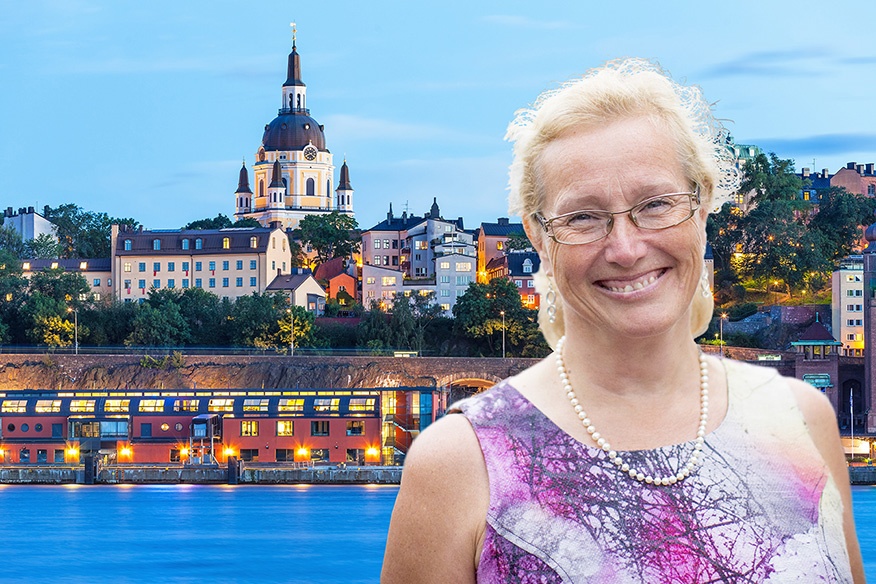Eva Åkesson, Uppsala University
Eva Åkesson has always been a keen learner who enjoys a challenge. Coming from a non-academic background only motivated the determined Professor and Vice-Chancellor at Uppsala University. “Understanding that a culture and an environment can feel alien is a good experience. That may be why I’ve always been interested in internationalisation and broader recruitment”, says Eva Åkesson. Today, as always, she works to make sure everyone at Uppsala University feels welcome and included.
Swedish Press: Please tell us a little bit about your background.
Eva Åkesson: I grew up on a farm in southern Sweden. After finishing highschool, I moved to northern Sweden to study at Umeå University. I completed my doctorate in chemistry in 1989. I then moved to Minneapolis for my PhD. After two years in the U.S. I returned to Umeå. After obtaining a position sponsored by the Swedish Research Council I chose to continue my studies at Lund University.
My area of specialisation is femtochemistry – a research field that provides answers to the question of why certain chemical reactions take place but not others. It also explains why the speed and yield of reactions depend on temperature.
I was eventually appointed Professor of Chemical Physics at Lund University. I became director of studies and set about modernising the teaching at the department.
Soon I was offered the position of Vice-Rector at Lund University – a role that interested me. I aimed to work for the students’ best interests, to make the university a place for meetings, discussion and development.
My goal was to help make the university an organisation that helps make the world a better place. This attitude and these values have remained with me to the present day.
Swedish Press: Please tell us a little about your role as Vice- Chancellor of Uppsala University.
Eva Åkesson: I was appointed Vice-Chancellor in 2011 and assumed my position in January 2012. I have just been re-appointed for another three-year period, which is an honour and a pleasure.
In my day-to-day work, I represent an expert organisation and a seat of learning that, in many respects, drives and contributes to the development of Swedish society and the world. I work with the management team to strengthen the University’s position and to create conditions that enable Uppsala University to achieve its full potential.
During my years as Vice-Chancellor, we have devoted a great deal of attention to issues of quality, in terms of both education and research. Quality is about credibility. Society must be able to trust research findings, and we must make it clear that there’s a big difference between verified facts and opinions. This has become increasingly evident in recent discussions about the rejection of facts, with some people’s opinions being put on a level with research findings in public debate.
Another major undertaking has been the thorough evaluation of research that we have just conducted at Uppsala University. External reviewers from around the world have examined our research and our research environments and offered suggestions for improvements in the capacity of critical friends. The results are very interesting and useful. They will enable us to take action that will move us forward and strengthen us. Now we are going to undertake a similar review of all our educational programmes.
The reason we are doing this is that we recognise that research and education are international activities. Sweden is a small country and our students will go on to work in a global arena. Their opportunities depend on our good reputation, and even if we are proud to be currently ranked among the top 100 of more than 20,000 universities worldwide, we cannot rest on our laurels. Internationalisation is something we need to continue to prioritise, both in terms of external contacts and at home.

Swedish Press: The Swedish Centre for Studies of the Internationalisation of Higher Education was inaugurated on November 7, 2017. Please tell us a little bit about the new centre.
Eva Åkesson: Higher education in Sweden has been heavily internationalised over the last three decades. One of the more important events in the process of internationalisation was the introduction of student financial aid for studies abroad in 1989, which led to a tenfold increase in Swedish students studying abroad in the course of a decade.
Another event was the introduction of tuition fees for third-country students in 2011. This change led to an 80 percent decrease in the number of incoming students from the affected countries, but the numbers are now up again. Things move fast in the area of internationalisation, and flows of students can change substantially in a short period.
The centre is intended to act as a node for research and analysis on a local, national and international level. It is also meant to be a platform for collaboration with external actors such as government agencies in possession of relevant data and in need of analytical expertise.
Swedish Press: Who inspires you in your work?
Eva Åkesson: The students – they inspire me and give me new perspectives. My achievements would not have been possible without the students I have met in my profession.

Swedish Press: In which areas do you feel Sweden contributes most globally?
Eva Åkesson: I often make the point that knowledge knows no borders. Nor do the challenges we face. The way in which Sweden can and does contribute is by helping to build up the great jigsaw puzzle of global knowledge. I would like to stress that our contributions are based on the ideas and know-how of individuals, many of whom are former students or currently active researchers, often working together in global networks.
Swedish Press: How do you think the image of Sweden is changing and developing internationally, and particularly in North America?
Eva Åkesson: I think we are a country with a good reputation and I am convinced this will endure as long as we have the welfare state we have built up. Having said that, we know there’s been a good deal of debate about the Swedish social model in U.S. media and elsewhere. We’re probably more concerned about Sweden’s image than we ought to be. We should just get on with what we’re good at.
Swedish Press: How do you think Sweden has achieved the success it has despite being such a small country, population-wise?
Eva Åkesson: We are a country that offers many opportunities to succeed, thanks to our education system which gives everyone a chance. More can be done, of course, but equality and openness have been effective tools in creating a good society and a successful country.
Interviewed by Sofie Kinnefors
Photos: Uppsala University
First published February 22, 2018






